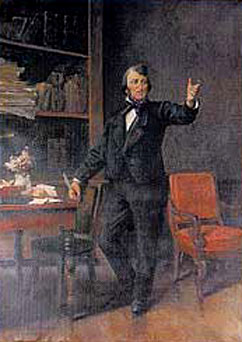| Jacques Jasmin  Born: 6-Mar-1798 Born: 6-Mar-1798
Birthplace: Agen, France
Died: 4-Oct-1864
Location of death: Agen, France
Cause of death: unspecified
Gender: Male
Race or Ethnicity: White
Occupation: Poet Nationality: France
Executive summary: Provençal poet Provençal poet, born at Agen on the 6th of March 1798, his family name being Boé. His father, who was a tailor, had a certain facility for making doggerel verses, which he sang or recited at fairs and similar popular gatherings; and Jacques, who used generally to accompany him, was thus early familiarized with the part which he afterwards so successfully filled himself. When sixteen years of age he found employment at a hairdresser's shop, and subsequently started a similar business of his own on the Gravier at Agen. In 1825 he published his first volume of Papillotos ("Curl Papers"), containing poems in French (a language he used with a certain sense of restraint), and in the familiar Agen patois -- the popular speech of the working classes -- in which he was to achieve all his literary triumphs. Jasmin was the most famous forerunner in Provençal literature of Mistral and the Félibrige. His influence in rehabilitating, for literary purposes, his native dialect, was particularly exercised in the public recitals of his poems to which he devoted himself. His poetic gift, and his flexible voice and action, fitted him admirably for this double role of troubadour and jongleur. In 1835 he recited his "Blind Girl of Castel-Cuillé" at Bordeaux, in 1836 at Toulouse; and he met with an enthusiastic reception in both those important cities. Most of his public recitations were given for benevolent purposes, the proceeds being contributed by him to the restoration of the church of Vergt and other good works. Four successive volumes of Papillotos were published during his lifetime, and contained amongst others the following remarkable poems, quoted in order: "The Charivari", "My Recollections" (supplemented after an interval of many years), "The Blind Girl", "Françounetto", "Martha the Simple", and "The Twin Brothers." With the exception of "The Charivari", these are all touching pictures of humble life -- in most cases real episodes -- carefully elaborated by the poet until the graphic descriptions, full of light and color, and the admirably varied and melodious verse, seem too spontaneous and easy to have cost an effort. Jasmin was not a prolific writer, and, in spite of his impetuous nature, would work a long time at one poem, striving to realize every feeling he wished to describe, and give it its most lucid and natural expression. A verse from his spirited poem, "The Third of May", written in honor of Henry IV, and published in the first volume of Papillotos, is engraved on the base of the statue erected to that king at Nérac. In 1852 Jasmin's works were crowned by the Académie Française, and a pension was awarded him. The medal struck on the occasion bore the inscription: Au poëte moral et populaire. His title of "Maistre ès Jeux" is a distinction only conferred by the academy of Toulouse on illustrious writers. Pope Pius IX sent him the insignia of a knight of St. Gregory the Great, and he was made chevalier of the Legion of Honor. He spent the latter years of his life on a small estate which he had bought near Agen and named "Papillotos", and which he describes in Ma Bigno ("My Vine"). Though invited to represent his native city, he refused to do so, preferring the pleasures and leisure of a country life, and wisely judging that he was no really eligible candidate for electoral honors. He died on the 4th of October 1864. His last poem, an answer to Renan, was placed between his folded hands in his coffin.
Father: (tailor)
Do you know something we don't?
Submit a correction or make a comment about this profile
Copyright ©2019 Soylent Communications
|